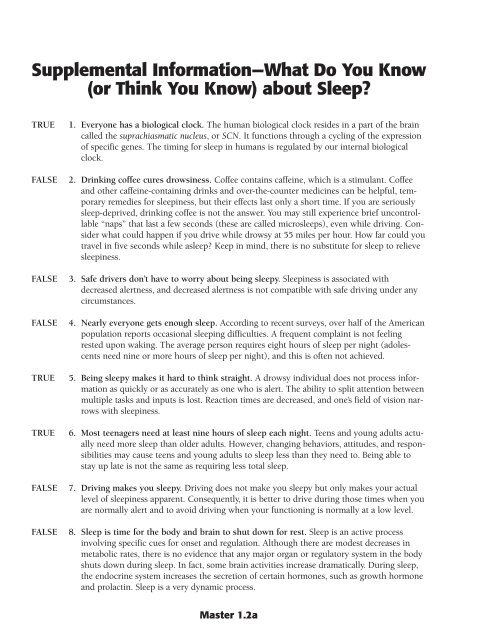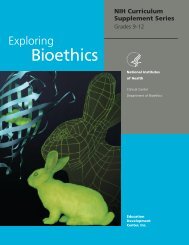Biological - NIH Office of Science Education - National Institutes of ...
Biological - NIH Office of Science Education - National Institutes of ...
Biological - NIH Office of Science Education - National Institutes of ...
You also want an ePaper? Increase the reach of your titles
YUMPU automatically turns print PDFs into web optimized ePapers that Google loves.
Supplemental Information—What Do You Know<br />
(or Think You Know) about Sleep?<br />
TRUE<br />
FALSE<br />
FALSE<br />
FALSE<br />
TRUE<br />
TRUE<br />
FALSE<br />
FALSE<br />
1. Everyone has a biological clock. The human biological clock resides in a part <strong>of</strong> the brain<br />
called the suprachiasmatic nucleus, or SCN. It functions through a cycling <strong>of</strong> the expression<br />
<strong>of</strong> specific genes. The timing for sleep in humans is regulated by our internal biological<br />
clock.<br />
2. Drinking c<strong>of</strong>fee cures drowsiness. C<strong>of</strong>fee contains caffeine, which is a stimulant. C<strong>of</strong>fee<br />
and other caffeine-containing drinks and over-the-counter medicines can be helpful, temporary<br />
remedies for sleepiness, but their effects last only a short time. If you are seriously<br />
sleep-deprived, drinking c<strong>of</strong>fee is not the answer. You may still experience brief uncontrollable<br />
“naps” that last a few seconds (these are called microsleeps), even while driving. Consider<br />
what could happen if you drive while drowsy at 55 miles per hour. How far could you<br />
travel in five seconds while asleep? Keep in mind, there is no substitute for sleep to relieve<br />
sleepiness.<br />
3. Safe drivers don’t have to worry about being sleepy. Sleepiness is associated with<br />
decreased alertness, and decreased alertness is not compatible with safe driving under any<br />
circumstances.<br />
4. Nearly everyone gets enough sleep. According to recent surveys, over half <strong>of</strong> the American<br />
population reports occasional sleeping difficulties. A frequent complaint is not feeling<br />
rested upon waking. The average person requires eight hours <strong>of</strong> sleep per night (adolescents<br />
need nine or more hours <strong>of</strong> sleep per night), and this is <strong>of</strong>ten not achieved.<br />
5. Being sleepy makes it hard to think straight. A drowsy individual does not process information<br />
as quickly or as accurately as one who is alert. The ability to split attention between<br />
multiple tasks and inputs is lost. Reaction times are decreased, and one’s field <strong>of</strong> vision narrows<br />
with sleepiness.<br />
6. Most teenagers need at least nine hours <strong>of</strong> sleep each night. Teens and young adults actually<br />
need more sleep than older adults. However, changing behaviors, attitudes, and responsibilities<br />
may cause teens and young adults to sleep less than they need to. Being able to<br />
stay up late is not the same as requiring less total sleep.<br />
7. Driving makes you sleepy. Driving does not make you sleepy but only makes your actual<br />
level <strong>of</strong> sleepiness apparent. Consequently, it is better to drive during those times when you<br />
are normally alert and to avoid driving when your functioning is normally at a low level.<br />
8. Sleep is time for the body and brain to shut down for rest. Sleep is an active process<br />
involving specific cues for onset and regulation. Although there are modest decreases in<br />
metabolic rates, there is no evidence that any major organ or regulatory system in the body<br />
shuts down during sleep. In fact, some brain activities increase dramatically. During sleep,<br />
the endocrine system increases the secretion <strong>of</strong> certain hormones, such as growth hormone<br />
and prolactin. Sleep is a very dynamic process.<br />
Master 1.2a

















